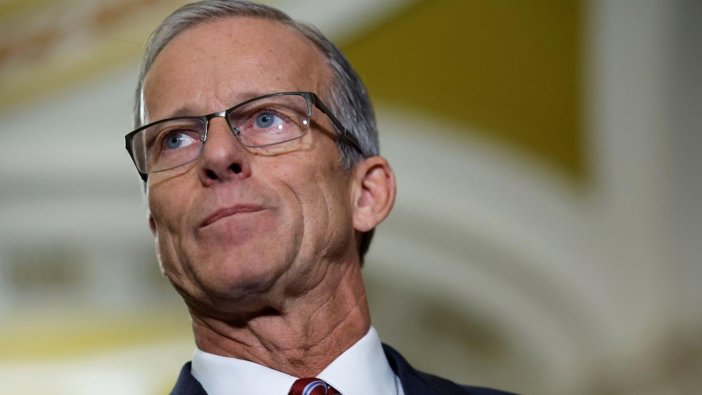
Thune Pushes Senate GOP to Pass Trump’s Megabill by July 4
Senate Majority Leader Thune pushes to deliver Trump’s sweeping legislative package by July 4 amid GOP divisions.
Thune Navigates GOP Divides to Advance Trump Agenda
Senate Majority Leader John Thune is pressing ahead to shepherd President Donald Trump’s expansive legislative package—dubbed the “big, beautiful bill”—through the Senate before the July 4 deadline. Despite resistance from both fiscal conservatives and moderate Republicans, Thune remains confident that the bill will reach the president’s desk on schedule.
In an interview from his leadership office, Thune explained the urgency: “We have to hit it, and whether that means the end of next week, or whether we roll into that Fourth of July week, we will. I think it’s that important.” He emphasized the need for deadlines to maintain momentum in the Senate’s legislative process.
The Senate bill incorporates a range of priorities, including the permanent extension of Trump’s 2017 tax cuts, major healthcare reforms, rollbacks of Biden-era energy credits, and significant federal spending reductions. Negotiations and drafting have been underway since early June, with each section of the bill now released and the floor vote targeted for the coming days.
Balancing Factions and Policy Disputes
Thune faces the difficult task of reconciling the demands of various GOP factions. Fiscal hawks, led by Senator Ron Johnson of Wisconsin, want deeper spending cuts—pushing for a return to pre-pandemic levels and more than $2 trillion in reductions over the next decade. Other senators, including Susan Collins, Josh Hawley, and Lisa Murkowski, have raised concerns about changes to Medicaid and their effects on rural hospitals and low-income Americans.
To advance the bill, Thune has been meeting with colleagues individually and working closely with the White House, seeking what he calls the “sweet spot” that secures the 51 votes necessary to move the legislation forward. With only a slim margin for dissent, every vote counts.
One sticking point is the Senate Finance Committee’s approach to the Medicaid provider tax rate, which includes gradual reductions in states that expanded Medicaid under the Affordable Care Act. Thune said the goal is to address abuse of the provider tax system while providing support for rural hospitals during the transition.
The fate of the bill also depends on the state and local tax (SALT) deduction cap, a contentious issue for lawmakers from high-tax states. The Senate’s current version leaves the cap at $10,000, prompting resistance from blue state House Republicans, while negotiations for a potential compromise continue.
Reconciliation and the Path Ahead
Behind the scenes, the Senate Parliamentarian is reviewing the bill to ensure compliance with the Byrd Rule, which limits the scope of legislation that can be passed through budget reconciliation. Thune has pledged not to overrule the parliamentarian’s decisions, but he notes that Senate Republicans are following the precedent set by Democrats in recent reconciliation bills to maximize their agenda’s reach.
Thune remains optimistic: “We’re pushing as hard as we can to make sure that it allows us to accomplish our agenda, or at least as much of our agenda as possible, and fit within the parameters of what’s allowed.”
With negotiations ongoing and key policy disputes still unresolved, the coming days will determine whether Trump’s legislative vision can unite Senate Republicans and pass before Independence Day. The outcome could reshape tax policy, healthcare, and federal spending for years to come.






